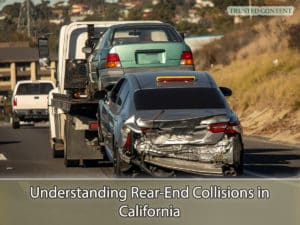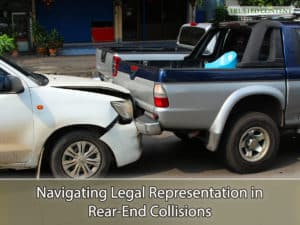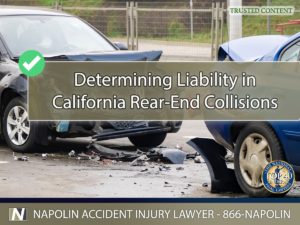Determining Liability in Ontario, California Rear-End Collisions
Rear-end collisions, a common occurrence on California roads, often lead to complex legal disputes regarding liability. Understanding the legal framework and factors influencing liability in these incidents is essential for anyone involved. This comprehensive guide explores the intricacies of California law as it pertains to rear-end collisions, offering valuable insights for those seeking to navigate these challenging situations.

Understanding Rear-End Collisions in California
Understanding Rear-End Collisions in California
In California, rear-end collisions are governed by specific traffic laws and principles. According to California Vehicle Code 21703, drivers must maintain a safe following distance, ensuring they can stop safely to avoid colliding with the vehicle ahead. This law forms the basis of liability determinations in most rear-end collision cases. However, liability is not always straightforward, as multiple factors, including road conditions, driver behavior, and vehicle maintenance, can influence the outcome of a case.
Examining Liability and Contributory Negligence in Rear-End Collisions
While the rear driver is often presumed liable in rear-end collisions, California's comparative negligence system allows for shared responsibility. Under this system, if the leading driver's actions contributed to the accident, such as sudden braking without cause or having non-functional brake lights, they may also bear a portion of the liability. The final determination of liability is based on the proportion of fault assigned to each party involved.
The Critical Role of Evidence
Solid evidence is crucial in rear-end collision cases. This includes gathering and analyzing accident scene photos, surveillance footage, vehicle damage reports, and witness statements. Additionally, the police report, which provides an official account of the incident, is a key document. Medical records linking injuries to the collision are also vital, as they establish the direct impact of the accident on the individuals involved.

Navigating Legal Representation in Rear-End Collisions
Navigating Legal Representation in Rear-End Collisions
Legal representation is invaluable in rear-end collision cases, especially in interpreting and applying California's complex traffic laws. An experienced attorney can effectively manage the collection and presentation of evidence, negotiate with insurance companies, and, if necessary, represent the victim's interests in court. They play a pivotal role in ensuring that the victim's rights are protected and that they receive fair compensation for their injuries and losses.
Immediate Actions Post-Collision
After a rear-end collision, immediate actions can significantly impact the outcome of any legal proceedings. Victims should seek medical attention promptly, even if injuries seem minor, as some symptoms may appear delayed. Documenting the scene, if possible, and obtaining contact information from witnesses are also crucial steps. These early actions lay the groundwork for a strong legal case and ensure that important evidence is preserved.
Dealing with Insurance Companies
Interactions with insurance companies are a critical aspect of rear-end collision cases. California law requires drivers to report accidents to their insurance company. However, it's important to consult with an attorney before making any statements or accepting settlement offers. Insurance companies often aim to minimize payouts, and an attorney can negotiate to ensure that any settlement reflects the true extent of the damages and injuries sustained.
The Litigation Process and Statute of Limitations for California Auto Accidents
In cases where settlement negotiations fail, litigation may be necessary. California's statute of limitations for personal injury claims is two years from the date of the accident. This timeframe is crucial, as failing to file within this period can result in the loss of the right to sue. During litigation, the attorney presents evidence and arguments to demonstrate the other party's liability and the extent of the victim's damages.

Determining Liability in Ontario, California Rear-End Collisions
Determining Liability in Ontario, California Rear-End Collisions
Understanding the legal aspects of rear-end collisions in California is crucial for anyone involved in such an incident. If you're facing this situation, seeking professional legal assistance is a vital step. Contact Napolin Accident Injury Lawyer at (909) 962-8415 for a free consultation. Our team, with extensive experience in handling rear-end collision cases, is dedicated to guiding you through the legal process, ensuring your rights are protected and you receive the compensation you deserve.
